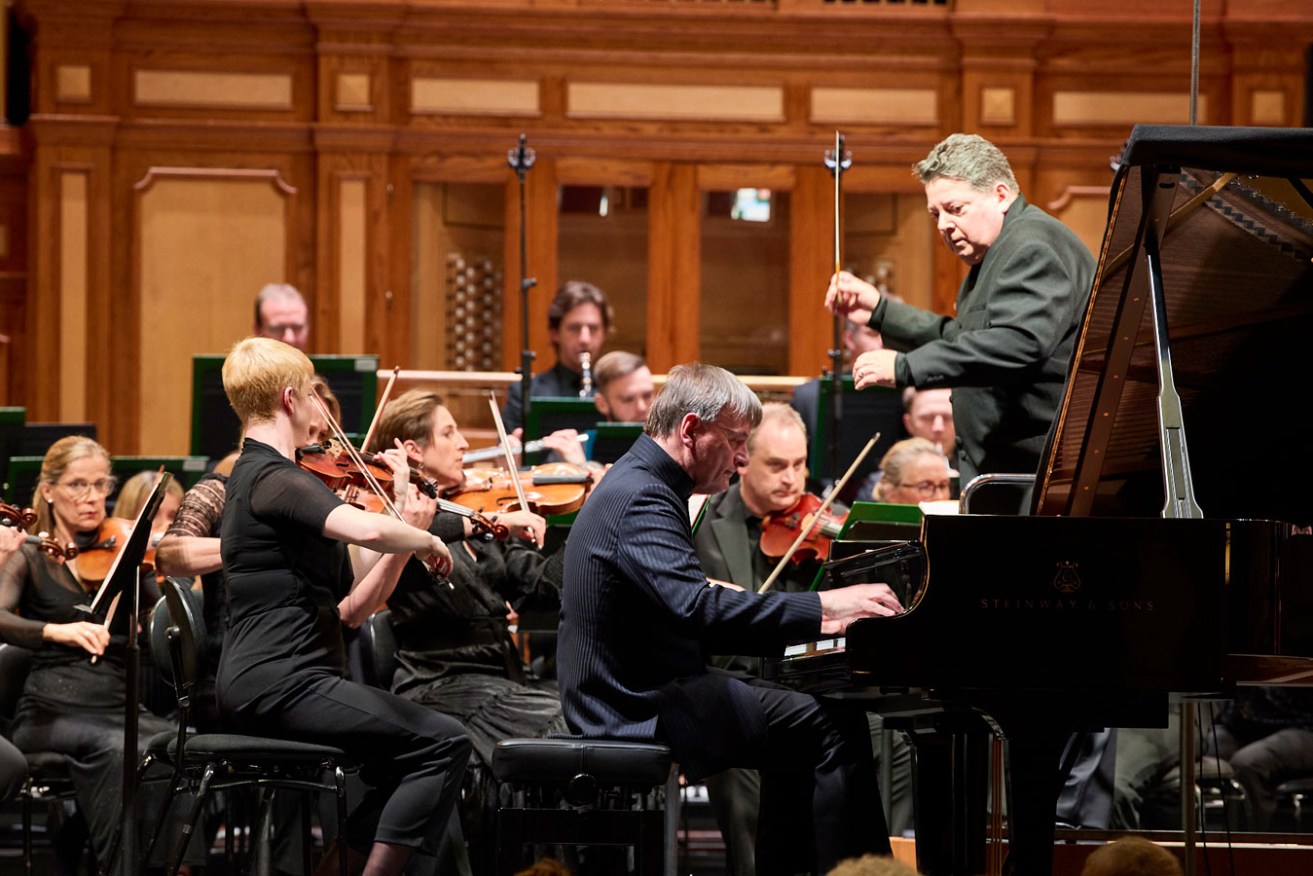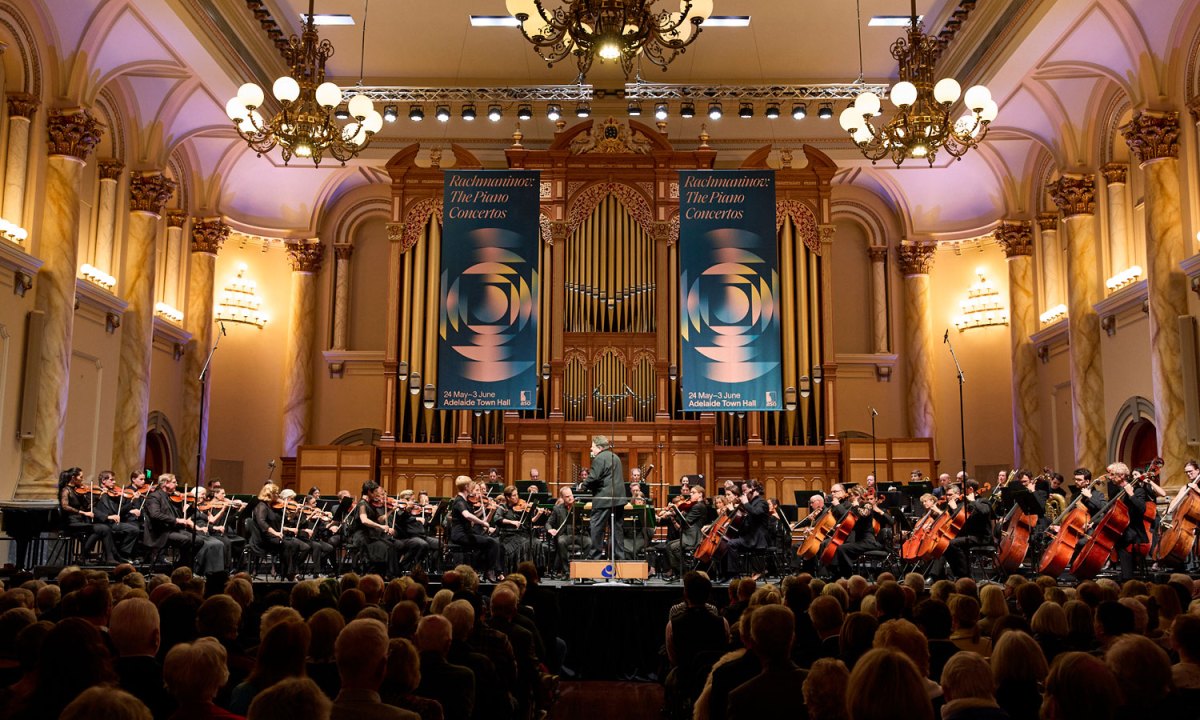Music review: Rachmaninov – The Piano Concertos 1
Pianist Stephen Hough was deeply impressive in Rachmaninov’s First Piano Concerto, and conductor Andrew Litton propelled the ASO to superlative heights in both this and Tchaikovsky’s Fifth Symphony.


The Adelaide Symphony Orchestra performs the first concert in its Rachmaninov – The Piano Concertos series with pianist Stephen Hough and conductor Andrew Litton. Photo: Claudio Raschella / supplied
Some fancy footwork was obviously needed to bring out the internationally celebrated UK pianist Stephen Hough and American conductor Andrew Litton to perform all four piano concertos of Rachmaninov with the Adelaide Symphony Orchestra. Just for the record, this pair of musicians took part in one of the most admired recordings of the concertos for Hyperion with the Dallas Symphony Orchestra in 2004 – it collected effusive reviews and has come to be regarded as the modern-day definitive interpretation of these works.
Well here in Adelaide they are, and one could only wait with bated breath to see what the Hough and Litton combination would do in partnership with the ASO in the first concert of this four-part series, Rachmaninov: The Piano Concertos. For the record, Hough has been in Australia many times before, notably to participate in the ASO’s Beethoven Festival in 2014, whereas Litton – music director of the New York City Ballet – has never been here before.
Belting horns and a thunderous cascade of octaves across the keyboard at the start of Piano Concerto No.1 in F sharp minor, Op.1, immediately announced what this Rachmaninov journey would all be about. Hough has immense strength, is razor-sharp in his timing, and every note is tautly controlled. Not a hint of sweat emanates from his brow as he dispatches the first movement’s fiery, heroic bravura. He and Litton maintain constant eye contact, and the orchestra is phenomenal – completely with the pianist at every step and sounding a class above themselves.
There can be vastly different ways of playing Rachmaninov. This concerto can sound showy and syrupy if judgment lapses. The composer himself played this concerto with athletic speed and enormous contrasts of mood (a recording he made in 1941 is marvellous). Hough plays with more modern precision but with a similar range of intensity and temperamental discipline. His passion is completely free-flowing but formalised, ridding any unnecessary indulgence.
Hough’s cadenza in the first movement is amazing: while keeping the coolest demeanour, he piles on the stormy aggression relentlessly. He, Litton and the orchestra keep a white-hot momentum to the very last breath.
The second movement takes us to an altogether different place, as if in a smoke-filled lounge where the pianist is left alone to meander idly over the keys. Hough is the consummate cabaret crooner here, if you like, sensuous and human-touched. It takes some excellence of timing to stitch in the orchestra seamlessly, and the communication that flows between him and Litton is masterful. A film director could not edit this unfolding rapture to better effect.
It is unbelievable that Rachmaninov wrote this masterwork at the age of 17 and 18. The third and fourth movements are brilliant and look towards the Symphonic Dances that he wrote much later in life. Certainly it has its schmaltzy moments, but the inspiration in this concerto, as well as the artistry of this performance, were genuinely things to behold.

Rachmaninov – The Piano Concertos at the Adelaide Town Hall. Photo: Claudio Raschella
This ASO “special event” is timed to celebrate the 150th anniversary of the composer’s birth, although in fact it was equally about Tchaikovsky in this first concert by virtue of what followed, namely the latter’s Symphony No.5 in E minor, Op.64. The combination passes muster: the two composers profoundly illuminate each other in their emphasis on melody, orchestration and temperament; indeed, in their lifetimes they closely followed each other’s work and shared a considerable mutual respect.
One sensed straight away how well prepared the ASO were for this symphony. It was an exceptional performance by them. Litton might be new to the players, and they to him, but their collaboration was remarkable for its degree of understanding and empathy. Litton is a most absorbing conductor to watch, for a start. His gestures are economical, simultaneously aimed at heightened expression and precision timing. But when the big stuff happens, as it repeatedly does in Tchaikovsky, his direction then becomes as commanding as a military general doing battle. In addition to gorgeous arch-shaped melody in this performance, there were climaxes of spectacular energy where Litton let the musicians rip.
This Fifth was both deliriously beautiful and exciting beyond any expectation. The ASO’s wonderful playing was clearly intensively honed and rehearsed. What a difference a top conductor makes. If only this gentleman could become its next conductor, or at least visit again.
The ASO’s Rachmaninov: The Piano Concertos, with pianist Stephen Hough and conductor Andrew Litton, continues on May 27 and 31 and June 3 in the Adelaide Town Hall.




